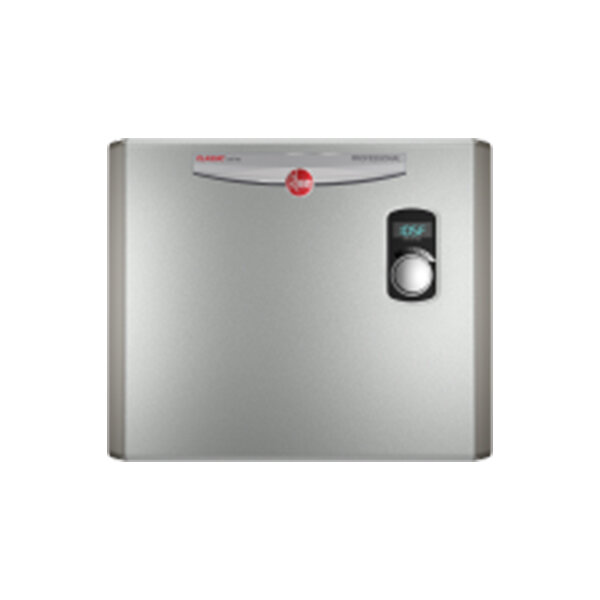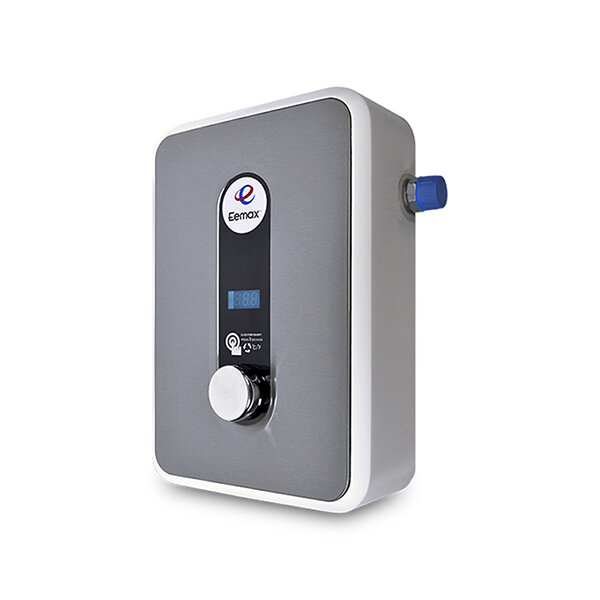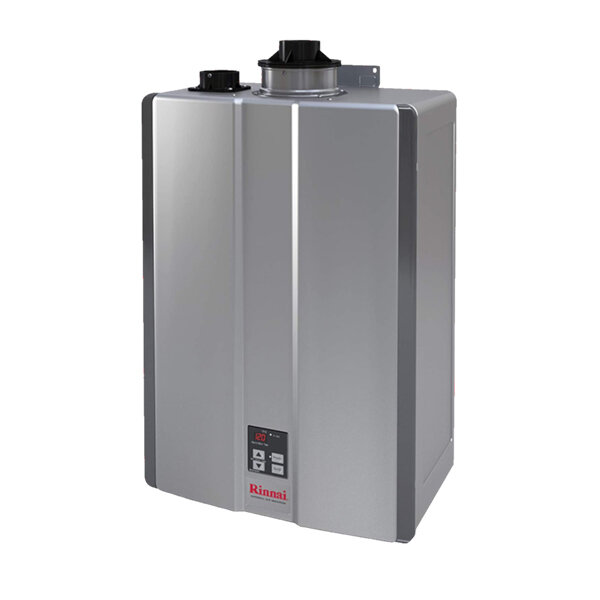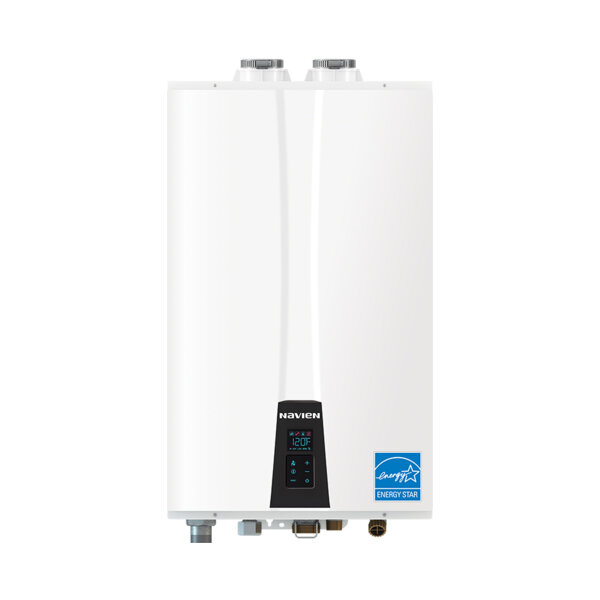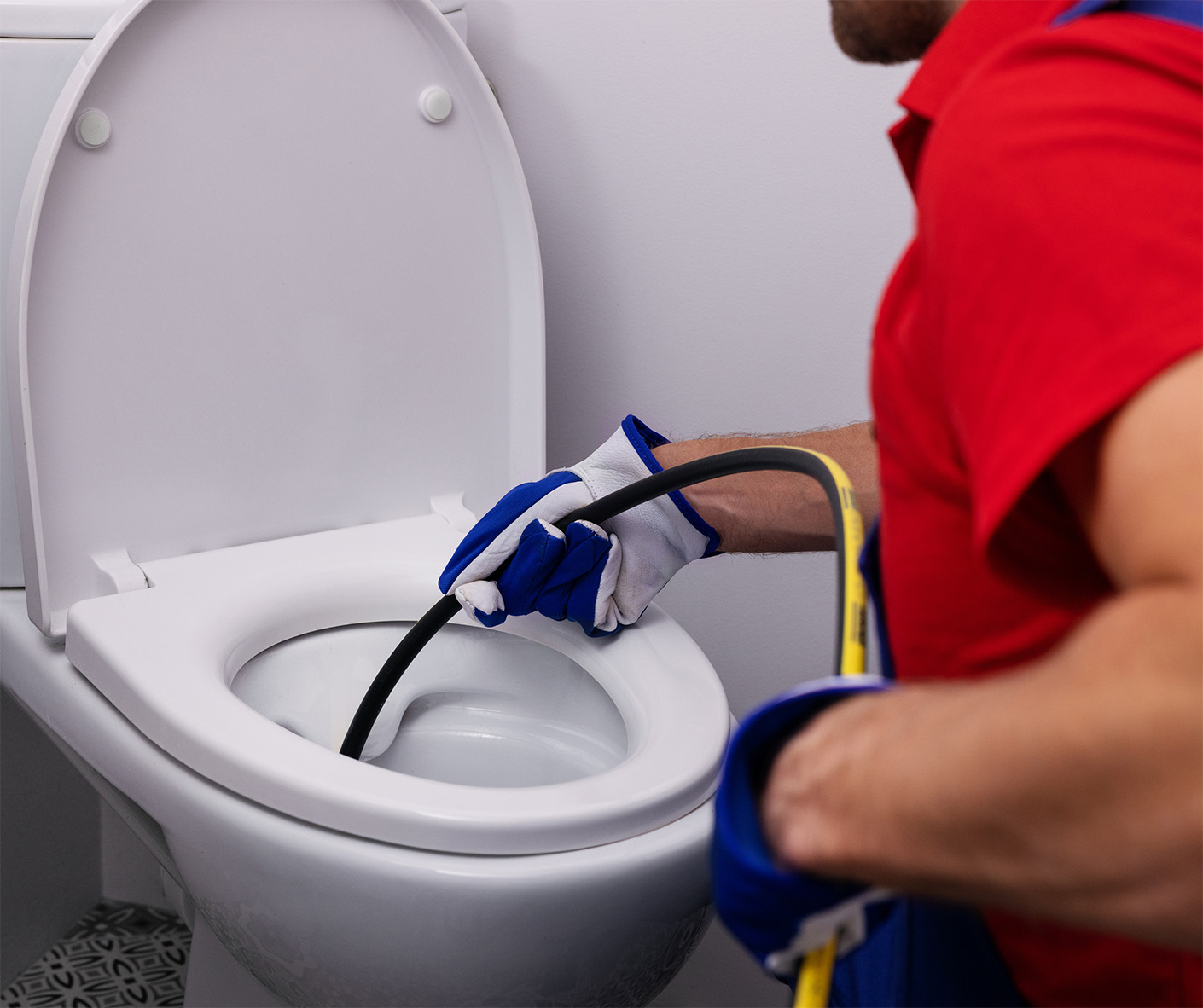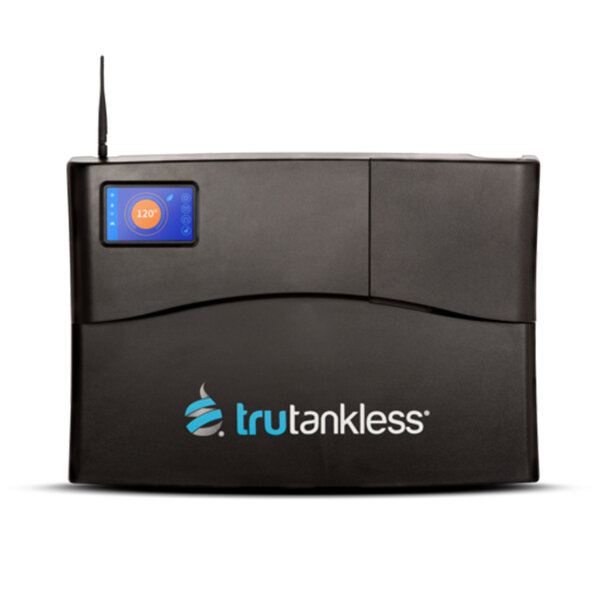
Tankless Water Heaters with Trutankless®
Live your life with endless hot water by going tankless. Stuart’s Plumbing provides the most updated hot water heater technology in the form of tankless water heaters with Trutankless®. The benefits of a tankless heater are vast; from space-saving to money-saving, going tankless will provide your home with continuous hot water without the fear of tank failure or health hazards.
99% Efficiency
Self-flushing design eliminates most maintenance requirements
Offers comfort and economy modes
Threaded elements for ease of service
and replacement
Temperature and pressure monitoring
and relief
Automated customer service call notifications
Remote diagnostics
Live support with Trutankless® professionals
Lifetime Limited Warranty on heat exchanger
2-Years Labor, 5-Year Parts Warranty
Extended Manufactures Warranties Available
Tankless heaters are smart. Control your heater from your phone or device by connecting it to your smart home. This not only maximizes your potential to save money but provides customizable features that best fit your lifestyle.
Since hot water usage accounts for 25% of residential energy costs, Trutankless® predicts Americans would save $8.1 billion annually if families switched to tankless heaters. Allow Stuart’s Plumbing, a Preferred Partner with Trutankless®, to walk you through the process of selecting the best tankless option for your home.
Discover endless hot water for your home
Tankless Water Heaters – What Every Homeowner Should Know
If your home’s hot water consumption is relatively high, say 41 gallons or more per day, tankless water heaters can offer 24%-34% more energy efficiency compared to traditional storage tank heaters! The more hot water you use, the more you can save on your water heating energy cost. That’s why you should consider a switch to tankless water heaters. We highly recommend gas tankless water heaters, as they could prove to be a game-changer for both your energy bills and your home’s supply of hot water.
Now, before you go scratching your head, thinking this is another one of those sophisticated technology advancements, let’s unravel this mystery together. In the following guide, we will explore this riveting world of tankless water heaters in a simple, fun, and accessible way. This journey will help you understand the various types of tankless water heaters and how they could fit into your home. We’ll also delve into their benefits and why they might be a smart choice for your hot water needs. Think of this guide as your trusty roadmap, providing you with all the information needed to navigate the sometimes-overwhelming terrain of home water heating.
What Are the Different Types of Tankless Water Heaters?
Hot showers are pure bliss, aren’t they? Have you ever stopped to think about the marvel that ensures this delightful cascade of hot water? It’s all thanks to different types of water heaters that work tirelessly behind the scenes. While traditional storage water heaters have long been the norm, many homeowners are now looking at tankless water heaters as a viable option.
Let’s talk about these miniature marvels that have been creating quite a buzz. The beauty of tankless water heaters lies in their ability to heat water just when you need it—like when you turn on the hot water tap.
On-Demand Service
It’s all about on-demand service, with no need for storing and continually heating water. They stand out from the crowd with their efficiency, taking up less space, and reducing the energy drain that comes from keeping a large volume of water heated all the time. Let’s get into specifics. We’ve got two main types of these smart devices—the electric tankless water heaters and their gas counterparts.
As their names suggest, electric versions use electrical resistance heat exchangers to transform cold water into the warm, comforting water that makes showers so enjoyable. In contrast, gas tankless water heaters employ a natural gas burner to provide the same warm results. Now, prepare to be amazed because there’s a third type that’s joining the tankless league—condensing tankless water heaters. This efficient design takes resourcefulness to another level by reusing exhaust gasses to give the water an extra heat boost. Pretty ingenious, right? So, in a nutshell, there’s a whole exciting array of tankless water heaters waiting to help transform your home into an energy-efficient haven.
How Do I Know if My Home Can Accommodate a Tankless Water Heater?
Choosing to go tankless is a bit like deciding to adopt a pet. It’s exciting, but you have to make sure your home is ready for the new addition. So, how can you tell if your home is a good fit for a tankless water heater? First off, think about your water usage. Tankless water heaters are perfect if your household uses more than 41 gallons of hot water a day. For more substantial hot water needs, you might have to install multiple tankless heaters.Next, consider the energy source. Do you have a robust enough electrical system for an electric heater, or do you have a suitable gas supply for a gas heater? Both types have their advantages. For instance, electric tankless water heaters don’t require venting, while gas heaters can handle larger households. Finally, you have to think about the location. Unlike their traditional counterparts, tankless heaters are compact, almost the size of a suitcase. They can be installed in more places around the house, offering more flexibility. So, think about where you’d want to put yours.
Benefits of Tankless Water Heaters
Imagine, a cold winter morning, and your shower offers you a steady flow of hot water. There’s no sudden rush of icy water when someone else in the house turns on a tap. Sounds good, doesn’t it? That’s one of the main benefits of a tankless water heater. With a tankless heater, you get a constant supply of hot water. The heater warms the water as you use it, so there’s no chance of running out of hot water. It’s a bit like having your own personal chef who whips up meals exactly when you want them.
Next, these heaters are energy efficient. They don’t need to keep a large amount of water hot all the time, saving energy. Plus, they’re compact and can save you some serious space. Lastly, their lifespan is something to talk about. A tankless water heater can last over 20 years with proper maintenance. That’s like buying a parrot and having a companion for two decades!
What’s the Difference: Tank vs. Tankless
Picture yourself in a grocery store, pondering whether to pick an apple or an orange. Both are fruits, but they come with unique benefits and tastes. This scenario mirrors the debate between tank and tankless water heaters. While both serve the same purpose—heating your water—they do it in quite different ways, each with its own perks and quirks.
Tank Heaters
Let’s start with the traditional tank heater. These are the stalwarts of the water heating world, reliable and straightforward. Picture them as a giant thermos that stores a significant volume of water, typically 30 to 50 gallons, and keeps it hot and ready for when you need it. With a tank heater, turn on the tap, and voila—hot water flows out. However, once the stored hot water depletes, you’re in for a wait as the tank refills and reheats the water.
Tankless Heaters
Shifting gears, let’s turn our attention to the tankless water heater. These are the sleek, innovative newcomers on the block. Think of them as your personal hot water chef, ready to whip up hot water the moment you turn on the tap. They heat water directly without the need for a storage tank. Hence, they don’t waste energy maintaining a tank full of hot water when not in use. This on-demand heating can lead to energy savings, earning them brownie points for being green.
Pros and Cons of Tankless Water Heaters
Just like most things in life, tankless water heaters come with their own set of strengths and weaknesses. It’s a bit like cookies and cream—some love the sweet smoothness, while others might find it too rich. Understanding these pros and cons can help you make an informed decision, ensuring that your new heater is the perfect fit for your home. So, let’s now look at the pros and cons in more detail:
Tankless Heater Advantages
Starting with the advantages, tankless water heaters excel in energy efficiency. Unlike traditional models, they don’t constantly use energy to keep a large tank of water heated. They spring into action when you turn on the hot water tap, meaning they use energy only when necessary. So, it’s no surprise they’re often considered the Energy Star of the water-heating world.
Then, there’s the convenience of an endless supply of hot water. Tankless water heaters don’t have a storage limit like traditional tank heaters do. They heat water on the fly, so you can say goodbye to chilly shocks in the shower or running out of hot water when you’re filling up the tub.
Plus, their compact size is a big bonus. They’re about the size of a small suitcase and can be mounted on a wall, freeing up valuable space in your home. Imagine what you could do with that extra room!
Potential Downsides to Tankless Heaters
Despite these impressive benefits, there are a few considerations to keep in mind. One potential drawback is that tankless heaters can take a few moments longer to deliver hot water. They need to heat the cold water first before sending it your way. While this usually only results in a slight delay, it might be a change if you’re used to instant hot water from a traditional tank heater.
Secondly, while tankless heaters excel at providing continuous hot water, they may struggle a bit when several taps are running at once. If your household tends to have multiple showers going on and the dishwasher running all at the same time, you might notice a dip in temperature. In such cases, multiple heaters or a hybrid approach might be worth considering. Yet, in a nutshell, tankless water heaters have much to offer, but they aren’t a one-size-fits-all solution. Weighing the pros and cons can help you find the best fit for your hot water needs.
Long-Term Costs of Tankless Water Heaters Compared to Tank
When it comes to cost, you’ll find it’s not just about the price tag on the box. It’s like buying a pet; you have to factor in food, vet bills, and cute little sweaters. Let’s dive into the nitty-gritty of the long-term costs of tankless water heaters compared to traditional tank heaters. Upfront, a tankless water heater tends to be pricier than a tank heater.
Think of it as investing in a pedigree pooch instead of adopting a mixed breed from the shelter.
But remember, you’re investing in advanced technology, compact design, and a longer lifespan. That’s right; tankless heaters can keep delivering hot water for more than 20 years with proper maintenance.
Installation Cost
Now, let’s talk about installation. Fitting a tankless heater, especially a gas one, can be more complex and hence more expensive. You might need to upgrade your gas line or add venting, almost like building a special doghouse for your new pedigree pooch. In terms of energy costs, however, the tankless heater shines. By only heating water when you need it, these units don’t waste energy keeping a big tank of water hot all day. The result? Significant energy savings in the long run. It’s as if your pedigree pooch eats only gourmet food, but surprisingly, that food costs you less over time.
Maintenance Costs
Maintenance costs are another aspect to consider. While both types of water heaters require regular upkeep, the process for tankless heaters is a bit more involved. This could potentially mean higher maintenance costs. But remember, due to their longer lifespan, you might be avoiding the cost of replacing a tank heater, usually every 10-15 years.
So, what’s the bottom line? Tankless water heaters often cost more upfront and to install, but they can claw back these extra costs over their longer lifespan with their energy efficiency. Choosing between a tank and tankless water heater isn’t just a decision about hot water, it’s also a financial commitment. Understanding the long-term costs involved can help guide your decision.
How Long Does a Tankless Water Heater Usually Last?
Think about the lifespan of a pet turtle – long, right? That’s the kind of longevity you can expect from a tankless water heater. This is the arena where tankless water heaters truly pull away from their traditional counterparts. If you’ve owned a traditional water heater, you know that after about 10-15 years, it’s time to start shopping for a new one. They tend to lose their efficiency over time, much like an old car begins to break down. This is where your investment in a tankless water heater starts to pay off.
But guess what? Tankless water heaters aren’t average pets; they’re more like the grand tortoises of the Galapagos! With proper maintenance, these units can keep delivering that comforting hot water for more than 20 years. Yes, you read that right—more than two whole decades of reliable service. Now, wouldn’t it be amazing to have a cat that lived into its thirties? That’s the kind of dependability and performance we’re talking about with a well-maintained, tankless water heater. So, while you might pay more upfront, you’re investing in a hot water solution that’s built to last. It’s a case of choosing quality and longevity over short-term savings, but for many, the trade-off is worth it.
What’s the Difference Between Electric and Gas Tankless Water Heaters?
See yourself at the car dealership for a moment, torn between a nifty, efficient compact car, and a powerful, spacious SUV. Both are great, but for different reasons. That’s the situation you’re in when deciding between electric and gas tankless water heaters. Electric tankless water heaters are like the compact car—they’re often smaller, easier to install, and more straightforward to maintain. But keep in mind that they might need a substantial electrical upgrade. It’s akin to needing a specialized charging station if you chose an electric vehicle.
Gas tankless water heaters, on the other hand, are the SUVs of the water heating world. They offer higher flow rates and can effortlessly handle larger households. But remember, they need proper ventilation, akin to how an SUV needs more space to maneuver. Both electric and gas heaters have their merits, and the decision boils down to your specific needs. Consider your household size, hot water demand, available energy sources, and budget before making your decision. In the end, whether you choose the Mini Cooper or the pick-up truck, both are equipped to take you on a journey to hot water bliss.
What’s the Installation Process for a Tankless Water Heater and How Long Does It Take?
Now, you might be wondering, “How tricky is it to get one of these tankless wonders up and running?” Well, it’s not as quick as popping a pizza in the oven, but it’s also not like building Rome. It’s a job for the pros, and it’s worth letting them take the wheel on this one. The installation process depends largely on whether you’re installing an electric or a gas heater. Think of it as the difference between setting up a new phone versus assembling a piece of IKEA furniture. For an electric tankless water heater, it’s about connecting it to your power supply—somewhat like charging a new phone. But keep in mind, as mentioned before, a significant electrical upgrade may be needed.
If you’ve chosen the gas route, you’ll need to ensure the gas line is up to the task and venting is properly set up. This is more like the IKEA job—you’ve got to make sure all the parts fit together correctly, and it’s done safely. When you’ve got an experienced professional doing the job, you can expect it to take anywhere between three to five hours. This is a small-time investment for endless hot water, don’t you think? Sounds like a win to us!
What Does Maintenance Look Like for a Tankless Water Heater?
Let’s touch on maintenance. Sure, it’s not the most glamorous aspect of owning a tankless water heater, but it’s as essential as taking your new puppy for its annual vet check-up. Regular maintenance is key to keeping your unit running smoothly, ensuring it performs at its best when you need that sweet hot shower on a chilly morning. Usually, a once-a-year service appointment is all your heater needs. Think of it as an annual spa day for your water heater, where it gets all cleaned up and checked over.
Professionals might also inspect the system for any issues, much like a vet would check your puppy’s heart rate or reflexes. This could include checking the burners on a gas model or the heating elements on an electric model. It’s a proactive step to catch any minor problems before they escalate into costly repairs. With regular maintenance, your tankless water heater is more likely to reach its life expectancy of over 20 years. So, while it might seem like an additional cost, in the long run, it’s worth it to keep your tankless water heater running efficiently.
Things to Know Before You Buy
Before diving headfirst into the tankless water heater market, consider a few things. First off, your hot water needs. Are you a small family that uses a moderate amount of hot water, or do you often find several appliances running simultaneously? Your answer will guide the size and type of heater you need.
Secondly, think about the energy type – electric, natural gas, or propane. Each has its pros and cons, and your choice might also depend on what’s readily available in your home. Lastly, think about the installation costs. These can be higher for tankless systems than for traditional ones. But don’t let this deter you, the long-term benefits can outweigh these initial costs.
How Does It Work?
Wondering how a tankless water heater does its job? Here’s a simple breakdown.
When you turn on the hot water tap, cold water travels through a pipe into the unit. Depending on whether you have an electric or gas model, an electric element or gas burner heats the water. Hence, a tankless water heater delivers a constant supply of hot water. You don’t need to wait for a storage tank to fill up with enough hot water. However, a tankless water heater’s output limits the flow rate. Meaning, they might not be able to heat and deliver a large amount of water simultaneously to multiple places.
Is a Tankless Water Heater More Efficient Than Other Water Heater Types?
In the battle for efficiency, tankless water heaters generally come out on top compared to their traditional counterparts. Because they heat water only when it’s needed, they don’t have the “standby” energy loss associated with storage water heaters.
To give you a bit of perspective, we can refer back to the government research that we linked in the intro. It says that for homes that use 41 gallons or less of hot water daily, tankless water heaters can be 24%–34% more energy-efficient than conventional storage tank water heaters.
The research also states that homes that consume a lot of hot water (around 86 gallons per day), can still be 8%–14% more energy-efficient. So, if you’re looking to trim your energy bills, a tankless water heater might be just the ticket!
Gas Tankless Water Heaters Rule
Ready to take the leap? If so, why not get in touch with us at Stuart’s Plumbing to get your tankless water installed? We have extensive experience with these heaters, and we can ensure you’ll be more than satisfied with our work.
